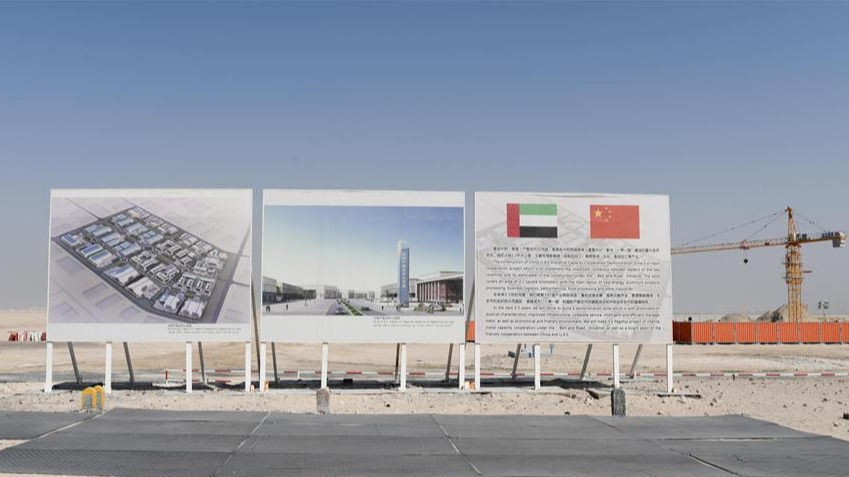
A band formation of the local police is seen during a parade celebrating the upcoming Chinese New Year at Expo City Dubai in the United Arab Emirates, January 14, 2023. [Photo/Xinhua]
By Shahid Hussain
China and the UAE are celebrating the 40th anniversary of the establishment of their diplomatic ties, which over the years have proven to be a fine example of relations between China and Arab states in the new era. In July 2018, the two countries established a comprehensive strategic partnership, forged on mutual respect, shared interests and a vision for a prosperous future. The UAE joining BRICS is testament to its commitment to multilateralism and diversified global partnerships.
China and the UAE policymakers are working to further streamline their strategic agendas to address global challenges like climate change, energy and food security.
The UAE's involvement in the BRI is transformative, demonstrated by a $10 billion investment in the UAE-China Joint Investment Cooperation Fund and multiple memorandums of understanding aimed at fostering growth across the Middle East and East Africa. Trade with BRI nations reached $305 billion in the first half of 2023, covering 90 percent of the UAE's non-oil trade and growing over 13 percent from 2022.
China remains the UAE's largest trading partner, with trade reaching $50 billion in the first half of 2024 alone, underscoring an 800-fold increase since diplomatic ties were established in 1984. The two nations aim to hit $200 billion in bilateral trade by 2030, reflecting a sustained commitment to economic synergy across sectors like telecommunications, renewable energy, transport and tourism.
In actively championing the BRI, the UAE reaffirms its role as an influential economic powerhouse, fostering sustainable growth and international cooperation. Its contributions are laying the groundwork for a more interconnected global economy, positioning the UAE as a vital bridge between East and West.

The construction site of the China-UAE Industrial Capacity Cooperation Demonstration Zone, in Abu Dhabi, the United Arab Emirates, July 16, 2018. [Photo/Xinhua]
Climate change poses a substantial threat to the planet, and addressing this challenge requires international cooperation. China and the UAE, as major energy producers and consumers, can play a pivotal role in the global transition to a low-carbon economy. By investing in renewable energy technologies, such as solar and wind power, and promoting energy efficiency, both countries can reduce their carbon footprints and contribute to a sustainable future.
In today's interconnected world, fostering collaboration in the tech sector is imperative for economic growth and innovation. One pivotal area is digital cooperation, where expanding partnerships in advanced technologies such as 5G, cloud computing, and cybersecurity hold significant potential. The rapid evolution of a digital infrastructure enhances connectivity and stimulates new business models and entrepreneurial ventures. By investing in these digital advancements, nations can create an environment conducive to innovation, thus positioning themselves as leaders in the global economy.
Another critical dimension of enhancing bilateral relations lies in financial services. Strengthening economic cooperation, particularly in promoting cross-border payments and investments, can streamline trade and investment flows between nations. Countries can facilitate seamless transactions by developing efficient financial systems and regulatory frameworks, which are essential for businesses seeking to operate in multiple markets. This financial synergy supports existing trade relationships and encourages new investment opportunities, ultimately contributing to sustained economic growth.
The UAE can further unlock opportunities for economic diversification and technological innovation in AI research and development, recognizing China's transformative potential across various sectors. By collaborating on AI initiatives, China and the UAE can accelerate innovation, create new industries, and boost bilateral trade. Joint research projects, talent exchange programs, and the establishment of AI hubs can foster a vibrant ecosystem of innovation where cutting-edge ideas are nurtured and brought to life.
Moreover, space exploration presents an exciting frontier for international collaboration. Joint projects in satellite launches and space research can yield significant advancements in science and technology. As countries pool their resources and expertise, they can tackle complex challenges, from climate change monitoring to advancements in telecommunications.
Cultural exchange and people-to-people ties are essential for building strong and enduring relationships. China and the UAE have a rich cultural heritage, and by promoting cultural exchange programs, student exchanges and tourism, both nations can deepen mutual understanding and foster goodwill. This will strengthen the bilateral relationship and enhance global cultural diversity.
Under the guidance of their respective leaderships, both countries are moving closer together, poised to play a pivotal role in enhancing their influence on the global stage. The potential for collaboration is immense, with aspirations to fully realize this potential as they approach the golden jubilee of their diplomatic ties.
Shahid Hussain, a special commentator on current affairs for CGTN, is the founder and CEO of the UAE-based company Green Proposition.

 中文
中文



